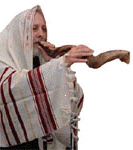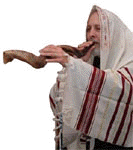|
|
|
|
|
Blow a Shofar in Zion
Cynthia Snyder, Staff
Writer * * * “Blow the ram’s horn in Zion; sound the alarm on my holy mountain! Let everybody in the country tremble, for the Day of [the LORD] is coming, yes, it is near” (Joel 2:1-2; Jerusalem Bible). Joel declares a day of destruction – a day of
fearful wrath – in this verse that is among the best-known references to
the shofar or ram’s horn in Scripture. Here, the shofar blast is one of
warning prior to catastrophe, despite a popular Messianic song which seems
to confuse this reference with the joyful second coming of the Lord: “Blow
a shofar in Zion, sound it on the mountain! Blow a shofar in Zion, for the
day of the Lord has come!” But above all, the shofar – the ram’s horn – is an instrument admirably suited to a single purpose: to sound a clarion warning. Its deep-to-high reverberation affects the human nervous system, creating an almost involuntary response of straightening, listening, and becoming alert. With the right wind conditions, across water, or with sufficient numbers of shofar blowers sounding their horns simultaneously, the sound can carry for miles. In ancient days, shofar blasts, relaying signals from town to town, literally served as the civil defense system of Israel. The intricate pattern of long and short tones communicated vital strategic information and marshaled a corresponding action. Wake up! Beware! Set watchmen on the walls! Assemble the fighting men! Prepare for battle! Today, however, the shofar is most closely associated with a single, very important day in the Jewish liturgical calendar. Rosh HaShanah, the feast commemorated as the spiritual “Head of the Year” is also called the Yom HaTeruah, or the Feast of Trumpets. As the first of the fall feasts, it fulfills an important position in the vanguard of the High Holy Days. On that day, the Lord commanded Moses to call a “sacred assembly commemorated with trumpet blasts. Do no regular work, but present an offering made to the Lord by fire” (Lev. 23:24-25). The sacrificial fires have long since ashed over, but the commemorative shofar blasts continue to be enthusiastically observed. In synagogues around the world, four patterns of notes are sounded: the long blast of the tekia, the three short, insistent, low-to-high alarm calls of the shevarim, the staccato broken pattern of the teruah, and finally the face-purpling, sustained, “great blast” of the tekia gedolah. Suspense builds each year as we draw near to the day when the shofar will take center stage. Who will blow the shofar this year? Can he actually blow it? Or, for that matter, can she? Will they sputter out, cheeks puffing, lips numb, producing that sad, windy tone that elicits pity and consolation after the service? Or will they find that sweet, resounding, glorious note that sends shivers up and down the spine and causes the nations to cheer? Yet while the congregation focuses on the sometimes dubious virtuosity of the shofar blower and commends or condemns his lung capacity, many lose sight of the reason for this sonic exercise. At Rosh HaShanah, there are much deeper questions to ask when the shofar is raised to the player’s lips. From the moment the first note is sounded, a state of spiritual readiness is demanded. Who among the listening people are in a position to respond with confident readiness to the warning blast? Whose armor and sword is at hand? Who is prepared with a swift “Hineni (Here am I), Lord!”? Who indeed, if not the Messianic believers, whom the Lord has armed for battle against the forces of spiritual darkness? Yet, too often, even the believer sits in spiritual idleness, hands limp by his sides, asleep at his watch station. If viewed properly as a spiritual rather than an auditory event, the shofar blast takes us from an initial shock of heightened awareness to, in varying degrees, a sigh of conviction. In the traditional synagogues, spiritual stirrings are supposed to occur at the sound of the shofar, awakening introspection. This day commences a time that actually steps out of time, a time that asks people to forget for a moment the rush of days and earthly obligations. The sinner has an opportunity to say in his heart: I have slept. I have sinned. I am not ready. At such times, the fields are indeed white for the harvest. Now a well-prepared witness, empowered by the Ruach HaKodesh (the Holy Spirit), could reach that individual, breaking through the modern delusion among our Jewish people that insists, “We don’t need a priest anymore. We don’t need someone to intercede for us.” After the shofar blast, there is a chance some will listen – and hear. The feasts provide a great context for discussion. Apart from the opportunity to stir the hearts of non-believers, this season also may bring a form of awakening to believers themselves. We have all experienced it: that conviction that we have let the side down, that we have compromised, that we have not given God the full measure of devotion. Even though we are saved and secure, we have slept. Though we are forgiven, we have sinned. In many ways throughout the year, our guard has slipped, and we have failed. But what hurts the most, from our perspective, is the sense that we have failed Him. Thankfully, the knowledge of who we are in Him soon comforts and encourages us, and we are back at our post, refreshed and ready, glad that the Lord used the shofar to awaken our sense of duty once more. No matter who we are, we are stirred out of our complacency on this day, even as we exchange the brightly spoken New Year’s greeting “L’ shanah tovah tikatevu (May you be inscribed for a good year).” Even as we eat apples dipped in honey and hope for a sweet year … even as we pull soft chunks from round challah loaves and think about new beginnings… Beneath the holiday laughter, there is still that tension of flesh and spirit at war with each other. And yet, for Messianic believers, the Ruach is always right there, before we despair, bringing us back to the rallying point: “Those who know their God shall do exploits!” As Messianic believers, we have answers – joyous answers! – to the anguished heart-cries of an unsaved world. We are especially positioned to confront the fear in the heart of our Jewish brother or sister, who wonders during this season if he or she will ever be right with God. Baruch Hashem (Blessed is the Name)! All the answers are “yes and amen!” in Yeshua. Have I been written in the Book of Life? If you know Yeshua, and commit your ways to Him, Yes! Has my sin been covered over? Yes! Not just covered, but removed as far as the east is from the west! Has the sacrifice been accepted on my behalf – now that there is no Temple? Yes! With Yeshua, our Great High Priest, forever and for all eternity – yes!! Those who know their Messiah are in a position to don the full armor God, seize the sword of the Spirit, and stand boldly at the ready, awaiting the marching orders of our Lord. We wear the uniform. We bear the insignia. We are signed and sealed by our Commander in Chief, the Lord of Hosts. We await the shofar as those who have been trained to respond to its call. We stand in battle-readiness, hearing it in our hearts more deeply than in our ears. Who would not rejoice to be armed with such knowledge and hope as we have been given? Beyond that, and growing more real to us every day, is the sense that the next shofar blast we hear may not be produced by the red-faced fellow on the bema, straining to sustain a three-minute tekia gedolah, but by an angelic herald of the heavenly host, calling the Bride to the very presence of her Lord! Then the alarm cry of the shofar blast will not call us to arm for battle, but rather, to be clothed for matrimony. And like Joshua the High Priest, whose sin-sullied, battle-stained clothes are removed and replaced with the pure, fresh white linen of imputed righteousness, so we will stand in joyous acceptance of the robes of atonement which our Lord bought for us with His precious blood. The realization brings both joy and heart-rending conviction. We are so unworthy. We need the Lord. We need Him. Only He is worthy. We need Him as deeply and completely as Abraham needed Him, as he faced the certainty of death – the shed blood of his own beloved son, and with him the hope of generations – unless the Lord provided Himself, a sacrifice. And there it was! The ram’s horns, caught in the bush; the divinely offered sacrifice – the substitute – prepared to take the place of man on the altar. The realization of our escape from eternal death stirs a joy far deeper than any surface sensation we might experience in our yearly rush to celebrate the first of the Fall Feasts. However beautiful the New Year’s card; however crisp and sweet the apple dripping honey; however much our hearts may soar to the rich, rising notes of the ram’s horn ... it is nothing compared to the reality symbolized in that ram which Abraham lifted his eyes to see. The sheer joy he must have felt. The unmitigated, pure joy he experienced at that moment of realization. Think about it. How will you respond to the clarion call of the shofar this year? As you slice the apples, and arrange them on a plate around the cup of honey, praise Him for all the many gifts with which he blesses us throughout the year…the sweetness of His love and mercy toward us, and the greater sweetness to come. All of this we do at Rosh HaShanah. Yet there is more. Most importantly, on this holy day, there are prayers to be said. Prayers in the heart. Prayers in the home. Prayers in the place of assembly. Traditionally, the Jewish people recite the She-heh-cheh’yanu: “Blessed art thou, O Lord our God, King of the Universe, Who has given us life and sustained us and enabled us to reach this season.” Say it with thanksgiving, but add to that traditional prayer a powerful, intercessory prayer for those who are without joy at this time, because they believe themselves to be without hope. Then reach out to them, not just in spirit but also in truth, while the sound of the shofar is still reverberating in your mind. It is a warning to the congregation of Messiah to
be diligent in the task set before us. We are called to action, for the
day of the Lord will indeed come soon, and with it, the last days of
harvest. * * * |
||



